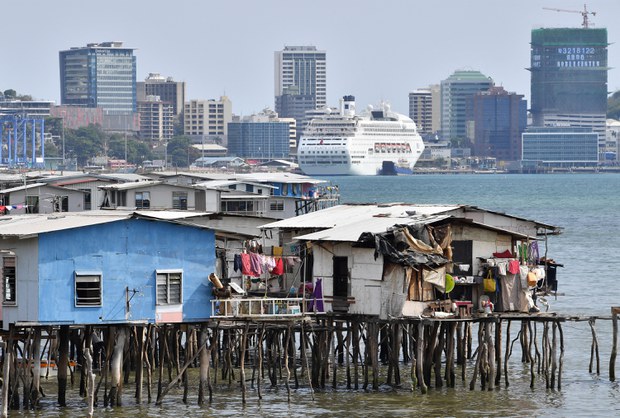Papua New Guinea capital restores power, water after landowners end protest
2023.10.04
Port Moresby
 This picture taken on November 19, 2018 shows makeshift dwellings on the outskirts of Papua New Guinea’s capital, Port Moresby.
This picture taken on November 19, 2018 shows makeshift dwellings on the outskirts of Papua New Guinea’s capital, Port Moresby.
Power and water supplies returned to Papua New Guinea’s capital on Wednesday after Prime Minister James Marape met some of the demands of landowners who had halted operations of a crucial reservoir.
A statement from Marape’s office said the Treasury Department would immediately release 5 million kina (U.S. $1.4 million) to the Koiari landowners. They disrupted the operations of the Sirinumu dam, a water treatment plant and the Rouna hydropower station on Tuesday in protest at the government’s failure to pay them 15 million kina, promised since 2018.
“Prime Minister Marape assured the Koiari landowners that the government is taking their concerns seriously and is committed to resolving the issue promptly,” said the statement, which also pledged to give the traditional landowners a 20% stake in the financial benefits of their land’s water.
Port Moresby suffered rolling power blackouts on Tuesday and taps dried up, likely affecting hundreds of thousands of residents. At least one hospital scaled down its operations to emergency services only, according to a provincial health authority notice seen by BenarNews. The capital city also has large informal settlements where people lack utilities such as running water.
Papua New Guinea, the most populous Pacific island country with more than nine million people, grapples with challenges such as corruption, lack of roads and basic healthcare in many regions as well as frequent tribal violence.

The country has one police officer for about every 1,800 people – nearly four times less than the level recommended by the United Nations to ensure law and order, according to a report published by the Griffith Asia Institute earlier this year.
Resource sharing has been regarded as a possible solution to conflict in Papua New Guinea that stems from foreign and local exploitation of minerals, fossil fuels and forestry that disadvantages landowners. But the Koiari landowners alleged that corruption among government officials was the reason payments due to them for the use of their land were not received.
Lawmaker Keith Iduhu, whose electorate encompasses Koiari land, said late-night negotiations with the protesters had resulted in an end to the standoff.
He said there had been a “cycle of unfulfilled promises” to landowners but he was hopeful that the government would establish a better system for compensating them.
Marape said the Koiari landowners need to be clear about who will be the recipients of the initial 5 million kina payment and called for the Treasury to be meticulous in its assessments before distributing the remaining 10 million kina.
He also proposed the landowners become 20% stakeholders in their region’s water resources in a structure involving 60% ownership by the state water utility and 20% ownership among the governments of Central Province and the National Capital District.
He said the proposal is “aimed at ensuring a more equitable distribution of resources among the Koiari landowners.”







